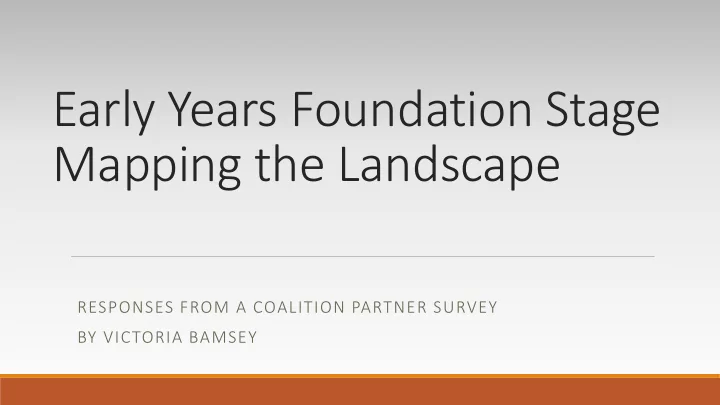

Early Years Foundation Stage Mapping the Landscape RESPONSES FROM A COALITION PARTNER SURVEY BY VICTORIA BAMSEY
Coalition Members National Day Nurseries Association (NDNA), Early Education Professional Association for Childcare and Early Early Childhood Forum (ECF) Years (PACEY), Early Childhood Studies Degrees Network Sector Endorsed Foundation Degrees in the (ECSDN), Early Years (SEFDEY), Early Years Alliance, TACTYC: the Association for Professional Development in the Early Years and the Keeping Early Years Unique (KEYU), British Early Childhood Education Research Montessori St Nicholas, Association (BECERA). National Children’s Bureau (NCB), British Association for Educational Research (BERA).
Background ❖ Focus on government drive to ◦ reduce workload, ◦ improve outcomes, ◦ improve social mobility ❖ 3,270 respondents ❖ From across the country, representing a range of roles, setting types, and experience
Participants 97% represent those working in settings 69% worked directly with children 72% had worked in the early years sector for more than ten years
Key Headlines ❖ Workload remains a concern ❖ Over 80% of respondents see the EYFS as supportive of children’s development within the prime areas of learning ❖ Over 60% of respondents see the EYFS as supportive of children’s development within the specific areas of learning ❖ Barriers to closing the gap include a lack of resources in terms of funding, training, parental involvement and inter-professional working ❖ The importance of taking a holistic approach to working with young children – the EYFS is not seen as a tool by itself to improve social mobility
Decreasing the Workload Workload was raised as a concern ◦ Excessive Paperwork ◦ Lack of time when working with outside professionals ◦ Lack of comparable frameworks between organisations Paperwork requirement related to: ◦ setting interpretations of Ofsted expectations ◦ Pressure from senior management team
Improving Outcomes How well does the EYFS meet children's needs? Comparison across Areas of Development EAD UW M L PSED PD C&L 0% 20% 40% 60% 80% 100% 120% C&L PD PSED L M UW EAD not at all 1% 1% 1% 3% 2% 3% 2% a little 13% 16% 15% 29% 27% 31% 21% well 61% 57% 55% 51% 53% 50% 55% very well 26% 27% 30% 17% 18% 17% 23% not at all a little well very well
Reaching their Potential Barriers: ◦ Lack of funding ◦ Resources and staffing ◦ Home learning environment ◦ Attitudes of parents ◦ Communication and language skills ◦ Lack of early intervention ◦ Lack of experienced and knowledgeable staff
Influence on the Home-Learning Environment How helpful is EYFS in guiding practitioners to support parents to improve Home Learning Environment? 16% 15% 13% 14% 12% 10% 10% 10% 10% 10% 9% 9% 9% 8% 6% 6% 4% 2% 0% 0-10 11-20 19-30 31-40 41-50 51-60 61-70 71-80 81-90 91-100
Improving Social Mobility The EYFS is not seen as a tool to narrow the gap Many of the barriers to social mobility cited by respondents are those which sit outside of the direct influence of early years settings Respondents appear keen to work with parents but the lack of funding, time and resources restricts this.
Summary ❖ A decreasing workload is dependent on how inspection requirements are interpreted by settings, not the EYFS itself ❖ The current EYFS is generally seen as supportive of children’s development across all seven areas of learning ❖ Barriers to closing the gap include a lack of resources in terms of funding, training, working with parents and inter-professional working ❖ The importance of taking a holistic approach to working with young children – the EYFS is not seen as a tool by itself to improve social mobility ❖ The EYFS on its own does not drive children’s outcomes or social mobility, instead it is a combination of the home learning environment, resources and early years expertise
References Department for Education (2013) Early years outcomes. A non-statutory guide for practitioners and inspectors to help inform understanding of child development through the early years. Education, D.f. London: Department for Education. Department for Education (2017) Statutory framework for the early years foundation stage. Setting the standards for learning, development and care for children from birth to five. London: Department for Education. Available. Department for Education (2018) 'Early Years Foundation Stage EYFS reforms'. 6th December 2018. Department for Education,. Department for Education (2019) 'Open early engagement Early Years Foundation Stage (EYFS) reforms', Department for Education (ed. 2nd July 2019. Department for Education,. Early Education (2012) Development Matters in the Early Years Foundation Stage (EYFS) This non-statutory guidance material supports practitioners in implementing the statutory requirements of the EYFS. London: Early Education,. Available. Ofsted (2015) The common inspection framework: education, skills and early years. Framework for inspections carried out, respectively, under section 5 of the Education Act 2005 (as amended), section 109 of the Education and Skills Act 2008, the Education and Inspections Act 2006, and the Childcare Act 2006. . Online: Ofsted. Available at: https://www.gov.uk/government/publications/common-inspection-framework-education-skills-and-early- years-from-september-2015 (Accessed: 27th July 2019). Ofsted (2018) Early years inspection handbook Handbook for inspecting early years in England under sections 49 and 50 of the Childcare Act 2006. Online: Ofsted. Available at: https://www.gov.uk/government/publications/inspecting-registered-early-years-providers-guidance-for-inspectors (Accessed: 27th July 2019). Ofsted (2019) Early years inspection handbook for Ofsted registered provision. Handbook for inspecting early years provision registered by Ofsted in England under sections 49 and 50 of the Childcare Act 2006. Online: Ofsted. Available at: https://www.gov.uk/government/publications/early-years- inspection-handbook-eif (Accessed: 27th July 2019).
Recommend
More recommend